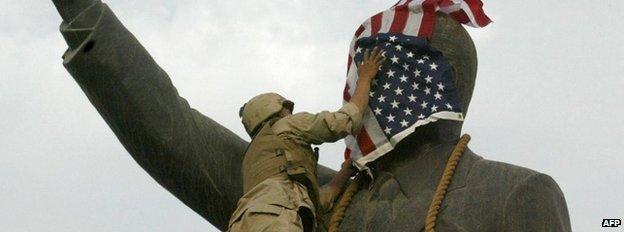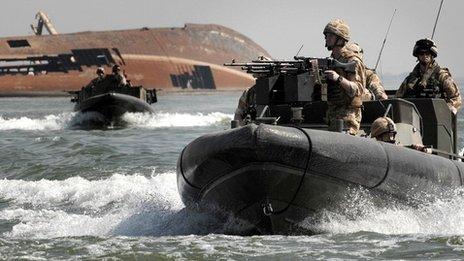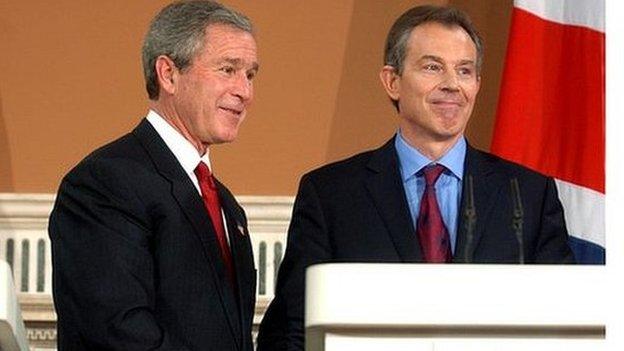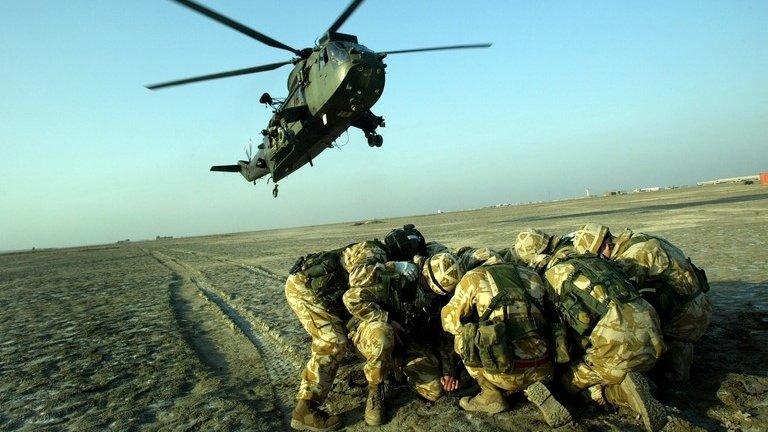Iraq War report: Publication 'far better' for me says Blair
- Published
Tony Blair says it is "completely wrong" to suggest he is behind delays in the publication of the Iraq Inquiry's report
Tony Blair has rejected suggestions he is behind the delay to the Iraq Inquiry report, saying it would be "far better" for him if it were published.
The former Labour prime minister told the BBC that publication would enable him to restate his case that the 2003 invasion was the "right thing to do".
He said he would be happy for his notes to President Bush to be made public.
Inquiry chairman Sir John Chilcot says there is "no realistic prospect" of publication before May's election.
MPs have reacted angrily to the news while David Cameron has said the inquiry should have started earlier.
In a statement, external, Mr Blair, who took Britain to war in Iraq in 2003, said he had "repeatedly" made clear that he was not responsible for hold-ups to the inquiry and suggestions to the contrary were "incorrect and politically motivated".
Speaking to the BBC's business editor Kamal Ahmed in Davos, where he is attending the World Economic Forum, Mr Blair said those blaming him were "completely wrong" and there was nothing preventing the inquiry getting on with writing the report.
"Never mind the election, I am frustrated it has not been published some time ago," he said.
"For people like myself, when this inquiry finally comes out, it gives me also frankly an opportunity to go out and say 'this is why I did what I did and this is why I believe it was the right thing to do'.
"For me, not to have this report published has been a problem over these last years. It would be far better if it was."
'Clear lessons'
Mr Blair said there were "clear lessons" to be learnt from the inquiry and he believed the report would be more relevant if it could refer to all his correspondence with President Bush.
"What I've said is this: if you're going to decide to publish, then publish them properly - not a gist of the letters. Now there are issues about confidential correspondence between a president and prime minister but when the decision was taken to at least make public the gist of them my actual recommendation was publish it and let people see."
In a letter to Prime Minister David Cameron, external, Sir John said "very substantial progress" had been made since his last update, but said the process of allowing people criticised to respond was still taking place.
He could give "no accurate estimate" of a completion date but that it would take "some further months".

Analysis
Nick Robinson, BBC political editor
Delayed again. Until after the election. Very suspicious say those who fear a cover up of the decisions taken by Tony Blair's government which led the UK to join George W Bush's invasion of Iraq.
Nick Clegg - whose Liberal Democrat party opposed the war in the face of combined Labour and Conservative support for it - says that some will fear that the report of the Iraq Inquiry is being "sexed down".
Few if any of those facing criticism in the report will speak publicly but I've been speaking to those familiar with what's going on behind the scenes.

In his response, Mr Cameron said he would have liked the report to have been published already and criticised the previous government for not establishing it earlier.
The inquiry began its work in 2009 and held its last public hearing in 2011.
It has been looking into the reasons for the UK's involvement in the 2003 US-led invasion that toppled Saddam Hussein and the aftermath of the conflict, which saw UK troops remain in Iraq until 2009.
Rose Gentle, mother of fallen soldier Gordon Gentle: "We feel totally let down"
During Prime Minister's Questions in the Commons, Mr Cameron said it was "extremely frustrating" that the report had not yet been published, but it would not be right for him to interfere with the independent inquiry.
He believed there was "no mystery" in the reasons for the delay and attacked Labour leader Ed Miliband, who he said had opposed the establishment of an inquiry when the idea had been previously put forward by the Conservatives.
Mr Miliband said the inquiry had been established six years ago, after combat operations ended, adding: "My views on Iraq are well known, and I want to see the inquiry published."
'In our name'
Mr Clegg said the public would assume the delay was caused by those criticised in the report attempting to "sex it down".
"The public have waited long enough and will find it incomprehensible that the report is not being published more rapidly than the open-ended timetable you have now set out," he said.
Deputy PM Nick Clegg says the delay is "incomprehensible" to the British public
Although the inquiry has never publicly set a deadline for publication, it has been plagued by delays with lengthy wrangling over what documents can be included in the final report.
The inquiry reached an agreement last summer with the UK government in which it would be allowed to refer to the "gist" of conversations and private correspondence between former Prime Minister Tony Blair and US President George W Bush.

The Iraq War

The US-led invasion of Iraq started on 19 March 2003 with a "shock-and-awe" campaign intended as a show of force
The US and the UK claimed Iraqi leader Saddam Hussein had weapons of mass destruction he was capable of using
The capital Baghdad fell in April and US President George W Bush declared "mission accomplished" weeks later
Saddam Hussein was captured, tried by the new Iraqi government and hanged. Insurgency continued
British forces ended combat operations in 2009 and the US did so the following year
A total of 179 UK service personnel and nearly 4,500 US soldiers were killed in the conflict
British-based organisation Iraq Body Count estimates 134,400 to 151,652 Iraqi civilians died since 2003, and United Nations estimates 18,805 between 2008-12 - all counts and estimates of Iraqi deaths are highly disputed
The Chilcot inquiry into the UK's role in the war was established by Prime Minister Gordon Brown in 2009

Conservative former Attorney General Dominic Grieve told BBC News Sir John should explain the "sequencing" of the process to reassure MPs and the public.
SNP deputy leader Stewart Hosie said he was "deeply frustrated and incredibly disappointed" by the delay, while UKIP deputy chairwoman Suzanne Evans said it "reeks of a joint establishment cover-up".
She added: "This was a war that was waged in our name, using our money, and we deserve to know the answers."
Rose Gentle, whose soldier son Gordon was killed in Iraq in 2004, said families were "really frustrated" at the drawn-out process.
She added: "We just feel constantly let down. We can't get over something like this until we find out."
MPs are due to debate the fate of the Iraq report next week while the Commons Foreign Affairs Committee has asked Sir John to answer questions about the progress of the inquiry.
- Published21 January 2015

- Published21 January 2015
- Published5 July 2016

- Published29 May 2014

- Published27 May 2014
